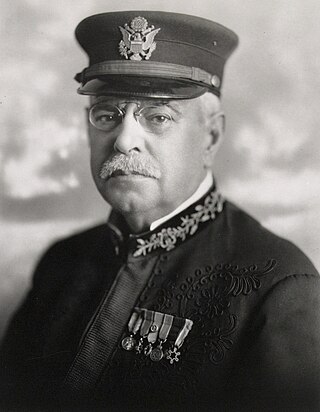
John Philip Sousa was an American composer and conductor of the late Romantic era known primarily for American military marches. He is known as "The March King" or the "American March King", to distinguish him from his British counterpart Kenneth J. Alford. Among Sousa's best-known marches are "The Stars and Stripes Forever", "Semper Fidelis", "The Liberty Bell", "The Thunderer", and "The Washington Post".
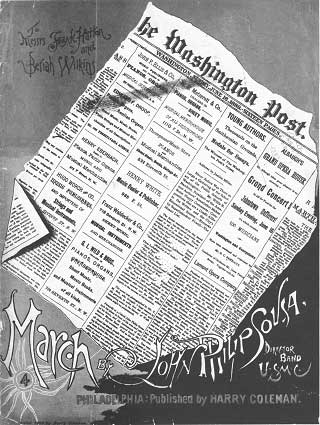
"The Washington Post" is a march composed by John Philip Sousa in 1889. Since then, it has remained as one of his most popular marches throughout the United States and many other countries.

The United States Marine Band is the premier band of the United States Marine Corps. Established by act of Congress on July 11, 1798, it is the oldest of the United States military bands and the oldest professional musical organization in the United States. Today, the Marine Band includes the Marine Chamber Orchestra and Marine Chamber Ensembles.

"The Fairest of the Fair" is a 1908 march by John Philip Sousa. One of Sousa's more melodic, less military marches, it was composed for the annual Boston Food Fair of 1908. It is claimed that the memory of a pretty girl he had seen at an earlier fair inspired the composition.

Claudio S. Grafulla (1812–1880) was a composer in the United States during the 19th Century, most noted for martial music for regimental bands during the early days of the American Civil War.

“The Minnesota March” is a march for wind band written by John Philip Sousa in 1927 for the University of Minnesota. Sousa received an informal request for the march from Minnesota football coach Clarence Spears, and agreed to a request from a committee of university officials in October 1926. Sousa used Indian themes in this march, and later added field drum and bugle parts. The march was published by the Sam Fox Publishing Company and was premiered by Sousa and his band on September 3, 1927 at the Minnesota State Fair. It was first performed at the University of Minnesota the next month, on October 26, with a performance by the university band.
The Gallant Seventh is a march composed by John Philip Sousa in 1922 whilst recovering from a broken neck. The march takes its name from the 7th Regiment of the New York National Guard. The conductor of the Regiment band was Major Francis Sutherland, a former cornetist in Sousa's own civilian band.
"The Thunderer" is a march composed by John Philip Sousa in 1889. The origin of the name is not officially known, though it is speculated that the name is attributed to Myron M. Parker, a prominent DC politician and Freemason. It is also one of Sousa's most famous compositions.

"The High School Cadets" is a march written in 1890 by John Philip Sousa in honor of the cadet drill team of Washington High School in the District of Columbia. It is in regimental march form (I-AA-BB-CC-DD) and is a popular selection for school concert and marching bands, as well as for professional orchestras and bands. The march has been arranged for a wide variety of instruments and ensembles, and has been frequently recorded, including at least two recorded performances by Sousa's own band. The march's final strains were featured in the 1939 film The Under-Pup.
The Mountaineer Marching Band, known as The Pride of West Virginia, is the marching band of West Virginia University located in Morgantown, West Virginia. The band was awarded the prestigious Sudler Trophy by the John Philip Sousa Foundation in 1997.
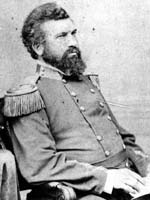
Francesco Maria Scala also known as Francis M. Scala, was an Italian-born naturalized American military band director and musician. He was the first and one of the most important and influential directors of the United States Marine Band. He defined the instrumental organization that the band maintains, he was an extremely prolific musician and composer, and improved and enlarged the repertoire of the ensemble. It is thought that under his direction the USMC Band executed for the first time "The Gendarmes' Duet" from Act II of the revision in 1867 of the Jacques Offenbach opera Geneviève de Brabant, which debuted in Paris in 1859. This melody is now known as the Marines' Hymn.
"The Royal Welch Fusiliers" is a march composed by John Philip Sousa in 1929, and then rewritten in 1930. It is the only march written by Sousa for a British Army regiment.

"Anchor & Star" is an American military march composed by John Philip Sousa in 1918, while he served as leader of the U.S. Navy Battalion Band at the Great Lakes Naval Training Center during the First World War.

"Imperial Edward" is an American military march composed in 1902 by John Philip Sousa, and dedicated to Edward VII, King of the United Kingdom. Sousa received permission to dedicate the march to Edward VII during a conversation with the royal family after his command performance concert at Sandringham on December 1, 1901. The march was premiered by Sousa's band in Montreal on May 21, 1902. Sousa would later conduct the piece for King Edward in January 1903, during a performance at Windsor Castle.

"The Invincible Eagle" is an American military march composed in 1901 by John Philip Sousa and dedicated to the 1901 Pan-American Exposition held in Buffalo, New York. Sousa began composing the march during an evening train trip between Buffalo and New York City, sketching his ideas in a pocket notebook.
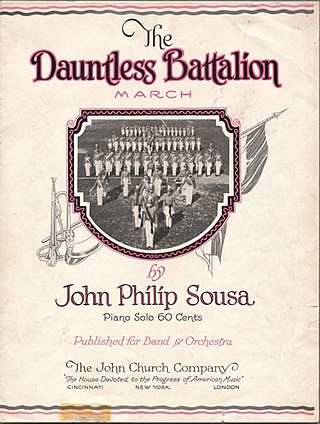
"The Dauntless Battalion" is an American military march by John Philip Sousa, published in 1922 and dedicated to the faculty and cadets of the Pennsylvania Military College (PMC) in Chester, Pennsylvania, known since 1972 as Widener University. Sousa received an honorary doctorate degree from the college in February 1920. Ohio senator and future president Warren G. Harding was also honored with an honorary degree.

Stephen Bulla is an American composer and musician best known compositions for the United States Marine Band and The Salvation Army.
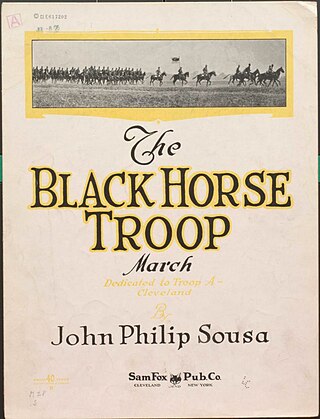
"The Black Horse Troop" is an American military march composed by John Philip Sousa in 1924 and published in 1925. It was dedicated to Troop A - Cleveland of the Ohio National Guard, today the 107th Cavalry Regiment. Sousa's first connection with Troop A was in 1881, when he marched with the unit as leader of the U.S. Marine Band in the funeral cortege of President James A. Garfield.














